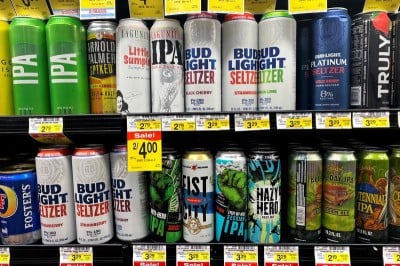advertisement
 © Reuters. FILE PHOTO: Cans of AB InBev's Bud Light hard seltzer are displayed in a fridge in Jewel-Osco supermarket in Chicago, Illinois, U.S. October 21, 2020. Picture taken October 21, 2020. REUTERS/Richa Naidu/File Photo ABI +2.85% Add to/Remove from Watchlist Add to Watchlist Add Position
© Reuters. FILE PHOTO: Cans of AB InBev's Bud Light hard seltzer are displayed in a fridge in Jewel-Osco supermarket in Chicago, Illinois, U.S. October 21, 2020. Picture taken October 21, 2020. REUTERS/Richa Naidu/File Photo ABI +2.85% Add to/Remove from Watchlist Add to Watchlist Add Position Position added successfully to:
Position added successfully to:
Position added successfully to:
(Reuters) -Anheuser-Busch InBev's shares rose around 2% on Tuesday after it announced a $1 billion share buyback, cheering investors who want to see the world's largest brewer returning more cash to shareholders while also paying down hefty debts.
AB InBev built itself into the behemoth it is today via a series of blockbuster acquisitions that saw several major brewers internationally merged into one global giant.
But the acquisition of Africa's SABMiller (LON:SAB) in 2016 left the maker of Stella Artois, Corona and Budweiser with a more than $100 billion debt overhang that it struggled to cut as quickly as hoped.
It has since shifted its strategy to focus on organic growth and brought debts down significantly, but they remain a key watch for investors who also want to see more funds returned to them.
The share buy-back will be executed over the next 12 months, AB InBev said, adding that it will also offer cash for $3 billion worth of bonds as part of its ongoing "focus on deleveraging".
Bernstein analyst Trevor Stirling said the buyback - AB InBev's first ever - was an important psychological signal to investors that the company could hit its debt-reduction targets, while the balance between that and returning funds to shareholders was also shifting.
"And all of that despite the weakness in the United States...is a remarkable testament," he added.
AB InBev cited a drop in the U.S. market and a "soft" environment in Europe as driving a decline in third quarter beer volumes.
Its Bud Light lost the top spot among U.S. consumers recently after a conservative backlash over a social media promotional campaign with Dylan Mulvaney, a transgender influencer.
But the company's overall revenue grew 5% in the quarter to $15.57 billion, versus the 4.7% expected on average by analysts, according to a company compiled consensus.
Higher prices and consumers opting for more expensive brews have helped brewers like AB InBev offset declining volumes.